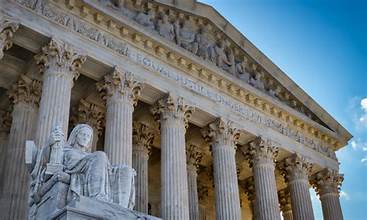Supreme Court debates whether insurers must still cover cancer screenings and cholesterol meds
WASHINGTON − The Supreme Court on Monday sounded unsure whether a popular provision of Obamacare that provides free access to cancer screenings, cholesterol-lowering medication and other health measures is constitutional.
The latest challenge to the 2010 Affordable Care Act comes from two Christian owned businesses and some people in Texas who say the health insurance plans they buy shouldn’t have to cover medical tests and drugs they object to on religious grounds. Having to pay for certain HIV-prevention medications, for example, would make them “complicit in facilitating homosexual behavior,” they’ve said.
A federal judge in Texas ruled the conservative challengers do not have to cover the HIV-prevention drug PrEP in their insurance plans because it’s against their religious beliefs.
But the judge also agreed with the businesses that one of the task forces of independent experts that recommends preventive services that insurers must cover − without co-payments or deductibles − is so powerful that, under the Constitution, its members must be appointed by the president and confirmed by the Senate.
In a twist from the first Trump administration, which tried to kill Barack Obama’s landmark health insurance law, Trump’s Justice Department is defending the law.
Justice Department attorney Hashim Mooppan told the Supreme Court the Health and Human Services secretary can fire task force members, can review their recommendations and can prevent them from taking effect. That means the volunteer experts don’t have to be confirmed by the Senate, he said.
“Yes, you have bureaucrats who contribute their expertise but, ultimately, the final decision power is in a politically accountable head of an agency,” he said.
The challengers, however, said the secretary doesn’t have complete control over the task force. For example, the law doesn’t give the secretary the ability to reverse a recommendation, argued attorney Jonathan Mitchell.
“At the end of the day….it is the task force recommendations that matters,” Mitchell told the court. “That is what is binding on insurers.”

If the Supreme Court agrees, health insurers would not be required to cover any of the care recommended by the U.S. Preventive Services Task Force after the ACA was enacted. (Other services, such as vaccines, that are recommended by different experts, are in dispute under another aspect of the case that is still in the lower courts.)
For example, in 2021, the task force extended recommendations for colon cancer screening to people 45 and older, instead of 50 and up, because of increased diagnoses in younger people.
The task force typically updates its recommendations every five years to account for medical advances or reflect new evidence of risk.
Before Obamacare, Americans used preventive services at only about half the recommended rate, according to the federal government.
The benefit is one of the most popular provisions of the law, which has largely survived more than 2,000 lawsuits and multiple trips to the Supreme Court.
Much of the current debate centers on a requirement that task force members and their recommendations “shall be independent and, to the extent practicable, not subject to political pressure.”
The government argues that simply means that while the task force can consider a request from the Health and Human Services secretary – and even be fired for not complying – they’re supposed to exercise independent judgment.
“That’s an odd definition of `independent,’” Justice Brett Kavanaugh responded.
But when questioning the other side, Kavanaugh said that when the government creates independent agencies, it usually does so with more explicit language.
“Your theory I think depends on us treating the task force as this massively important agency that operates with unreviewable authority to make really critical decisions that are going to affect the economy and without any supervision or direction by the secretary,” he said.
“Normally, before that kind of thing would happen, Congress would have provided stronger indications that this task force is enormously important in the American economy and would have treated it as such.”
Justice Amy Coney Barrett said the challengers have a “maximalist” definition of “independent. She asked whether there’s a way for the court to construe the term more narrowly to avoid a Constitutional problem.
Mooppan, the Justice Department attorney, said the court just needs to find the secretary exerts sufficient supervision over the task force.
But he acknowledged there’s a separate problem even if the court says the task force members are “inferior” and not “principal” officers. In that case, they would not have to be confirmed by the Senate but would still need to be appointed by the HHS secretary. Because that did not happen until the lawsuit began, courts would need to decide whether previously approved recommendations are no longer valid or if they can be re-approved by the task force, he said.
A decision in Kennedy v. Braidwood Management is expected by the end of June.
___________
This article was originally appeared on USA TODAY



